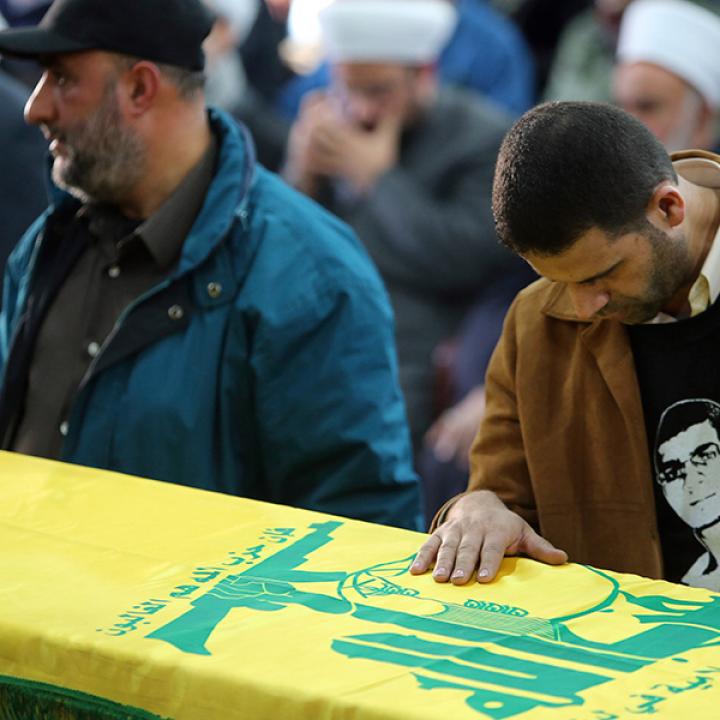
- Policy Analysis
- Articles & Op-Eds
Hezbollah Labeled Terrorist by GCC States – But What Do Their People Think?

March 8, 2016
In a remarkable if little-noticed development last week, all six GCC states – Saudi Arabia, Kuwait, the UAE, Qatar, Oman, and Bahrain – formally designated the Lebanese movement Hezbollah as a terrorist organization. This week, Israeli Prime Minister Netanyahu called this step “important and even amazing,” but the fact is that the decision has nothing to do with Israel. Rather, the move follows several years of growing Arab estrangement from Hezbollah over an expanding array of other issues: Hezbollah’s active military aid for Syrian dictator Bashar al-Assad, support for the Shiite Houthi opposition in Yemen, close ties with GCC arch-rival Iran, and reported involvement with terrorism, subversion, and espionage inside most GCC countries.
Nevertheless, Hezbollah’s leader Sheikh Hassan Nasrallah, speaking on March 6, tried to differentiate between official and popular Arab views of Hezbollah – which he claimed still stood, above all, for the rejection of Israel. “The reactions in the Arab world mostly support rejection,” he proclaimed, “and this is different from the position presented by some Arab regimes, mainly in the Gulf.” In this context, it is worth recalling that barely a decade ago, in the immediate aftermath of its 2006 war with Israel, Hezbollah’s popularity had skyrocketed in every survey of the Arab street – even as some Arab governments tried to distance themselves from what they called that “reckless” Lebanese militia. So Nasrallah’s outburst, self-serving as it may be, does raise a legitimate question: do Arab publics continue to support Hezbollah, even if their governments do not?
One place to begin looking for an answer to this question is the Arab press. Much of it is heavily state-controlled, to be sure, but sometimes there is room for some debate. In this case, however, the Gulf Arab media, especially in Saudi Arabia and the UAE, appear solidly behind the new terrorist designation and viscerally anti-Hezbollah. For example, Saudi pundit Saad al-Dosary wrote in Arab News on March 7 that Hezbollah “spread like a cancer… backed by a pure sectarian agenda from Iran, the party gradually took control of the country (Lebanon) like a mafia.” In a similar vein, prominent Saudi editor Turki al-Dakhil penned an op-ed in the mainstream daily Okaz the same day, with the provocative title “Should Gulf States Deport Lebanese People?” Citing another Saudi article that argued in the affirmative, al-Dakhil begged to differ. Instead, he concluded that “strict acts and decisiveness must only be adopted toward those who are working within the framework of armed militias rather than the Lebanese state, and taking orders from Iran.” In other words, Lebanese people may be acceptable, but Hezbollah is beyond the pale.
In the UAE, al-Bayan editorialized on March 4 that Hezbollah’s “so-called ‘resistance’ brought nothing but destruction, death, and scourges, both through Israel and through the sedition that it stirred within Lebanon and the other Arab countries.” Similarly, on March 7, the National’s lead editorial on “Hizbollah’s Mendacious Meddling” decried its “corrosive pursuit of Tehran’s agenda – including attempts to radicalize young Gulf nationals so they will commit terrorist acts at home and abroad.”
But beyond this controlled press, which largely reflects official or at least elite attitudes, the evidence from polling data more conclusively demonstrates Hezbollah’s precipitous loss of popularity on the GCC street. Polls I supervised there in September 2014 and September 2015 showed Hezbollah scoring just 13-15 percent approval ratings in Saudi Arabia and the UAE. The figure was only slightly higher, at 24 percent, in Kuwait, with its roughly one-third Shiite minority. Hezbollah’s patron, Iran, scored almost equally low. In fact, Iran’s approval rating among Saudis has dropped from a meager 13 percent to a minuscule 8 percent over the past year.
Along the same lines, in a September 2015 Zogby poll around 85 percent of the public in both Saudi Arabia and the UAE rated “Iranian-backed groups like Hezbollah” as a “significant” cause of the conflict in Syria. Almost identically high percentages in both countries labeled “militias and groups backed by the Iranian Revolutionary Guard” as a significant problem for the region as a whole.
Moreover, the most recent available survey data demonstrates that Hezbollah has lost most of its appeal among other Arab publics far beyond the Gulf states. In Egypt, according to the polls I supervised in September 2014 and again in September 2015, the overwhelming majority voice a negative opinion of Hezbollah. The September 2015 Zogby polls shows that fully 96 percent of Egyptians say that Iranian-backed groups like Hezbollah play a significant role in causing conflict in Syria and pose a significant problem in fomenting overall regional extremism. In Jordan, the latest polls show 86 percent of Jordanians hold a negative view of Hezbollah. Somewhat lower proportions, though still a solid majority, see its role as significant in both causing conflict in Syria (74 percent) and broader extremist strife (64 percent).
There is, however, one Arab society—namely, the Palestinians—where a real dichotomy exists between popular and official views of Hezbollah. The Palestinian Authority endorsed the GCC terrorist designation; Hamas offered no comment. In sharp contrast, a mid-2015 survey showed Hezbollah garnering solid majority approval ratings among the Palestinian public in both jurisdictions: 69 percent in the West Bank and 57 percent in Gaza. In this respect, as in others, the Palestinian public now differs greatly from fellow Arabs in other areas, especially in the Gulf.
Among those publics, as the preceding analysis indicates, what evidence exists strongly suggests that they largely accept their governments’ recent animosity toward Hezbollah. For Sheikh Nasrallah, what a difference a decade makes! In the minds of many he has transformed from “hero” against Israel in 2006, to “terrorist” today.
David Pollock is the Kaufman fellow at The Washington Institute and the director of Fikra Forum. This article was originally published on the Fikra website.
Fikra Forum



